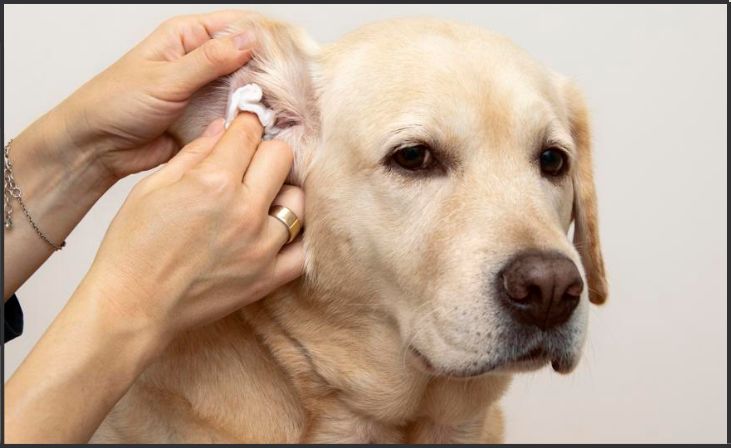Welcome to our comprehensive guide on the 10 most common health problems faced by our beloved Labrador Retrievers. As devoted companions, Labradors bring immense joy, but it’s crucial to be aware of potential health challenges that may arise.
In this blog, we’ll navigate through the intricacies of Labrador health, offering insights, tips, and advice to keep your furry friend thriving. Whether you’re a seasoned Labrador owner or considering bringing one into your home, understanding these health issues is paramount for their well-being. Let’s delve into the world of Labrador health together and ensure our four-legged friends lead happy, healthy lives.
1. Hip Dysplasia

Hip dysplasia is a prevalent health concern in Labrador Retrievers, stemming from a genetic predisposition. This condition occurs when the hip joint doesn’t develop properly, leading to improper fitting of the hip bone into the socket. Labradors with hip dysplasia may exhibit signs such as limping, difficulty rising, or a reluctance to engage in physical activities. Early detection is crucial, and interventions, ranging from weight management to surgical options, can alleviate symptoms and improve the quality of life for affected Labradors. Regular vet check-ups and tailored exercise regimes play pivotal roles in managing and preventing hip dysplasia in this breed.
2. Obesity
Labrador Retrievers have an innate love for food, making them susceptible to obesity. The tendency to overeat, coupled with a sedentary lifestyle, can lead to weight-related health issues. Obesity increases the risk of joint problems, diabetes, and cardiovascular issues. To combat obesity, owners should focus on a balanced diet, portion control, and regular exercise. Incorporating interactive toys and activities into their routine can stimulate both mental and physical well-being, contributing to a healthier weight. Maintaining an ideal body condition is essential for ensuring a Labrador’s overall health and longevity.
3. Otitis Externa

Labradors are prone to ear infections due to their floppy ears and a tendency to retain moisture. Otitis externa, inflammation of the outer ear canal, is a common health problem. Symptoms include head shaking, ear scratching, and a foul odor. Preventive measures involve regular ear cleaning, especially after swimming or baths, to minimize moisture retention. If signs of otitis externa appear, prompt veterinary attention is crucial to prevent complications. Treatment typically involves cleaning, medication, and addressing the underlying cause. Proactive ear care can significantly reduce the incidence of this painful condition in Labrador Retrievers.
Also Read: How to Train a Stubborn Dog
4. Progressive Retinal Atrophy (PRA)
Labrador Retrievers are predisposed to Progressive Retinal Atrophy, a hereditary eye disorder leading to gradual vision loss. Typically, PRA manifests as night blindness and progresses to complete blindness. While there is no cure for PRA, regular veterinary eye exams can aid in early detection. Responsible breeding practices can help minimize the occurrence of this genetic disorder. Though PRA poses a significant challenge, supportive measures such as maintaining a consistent environment and using cues other than visual ones can enhance the quality of life for Labradors affected by this condition. Regular veterinary monitoring is essential for managing PRA in Labrador Retrievers.
5. Elbow Dysplasia

Elbow dysplasia is another orthopedic concern in Labradors, characterized by abnormal development of the elbow joint. This condition can lead to pain, lameness, and difficulty moving. Factors such as genetics, rapid growth, and nutrition contribute to the development of elbow dysplasia. Treatment options range from medications to surgical interventions, depending on the severity. Implementing a balanced diet, controlled growth, and avoiding excessive exercise in young Labradors can aid in preventing elbow dysplasia. Regular veterinary assessments play a crucial role in identifying and managing this health problem to ensure the well-being of Labrador Retrievers.
6. Cruciate Ligament Rupture
Labrador Retrievers are prone to cruciate ligament rupture, often caused by sudden movements or excessive strain on the knee joint. This injury can result in lameness, swelling, and pain. Surgical intervention is commonly recommended to stabilize the joint and prevent long-term issues. Weight management and controlled exercise can reduce the risk of cruciate ligament injuries. Identifying early signs and seeking prompt veterinary care are essential for successful treatment. While cruciate ligament rupture poses a challenge, a proactive approach to joint health can contribute to the overall well-being of Labrador Retrievers, ensuring they lead active and pain-free lives.
7. Gastric Dilatation-Volvulus (Bloat)

Labrador Retrievers are susceptible to gastric dilatation-volvulus, commonly known as bloat. The stomach twists and fills with gas in this life-threatening situation. Symptoms include restlessness, abdominal distension, and unproductive vomiting. Immediate veterinary attention is crucial, as bloat can lead to rapid deterioration. Preventive measures include feeding smaller, frequent meals, avoiding strenuous exercise after meals, and using elevated food bowls. While genetics may contribute to the risk, environmental factors also play a role. Awareness and swift action are vital in managing and preventing this serious health problem in Labrador Retrievers.
8. Heart Disease
Labrador Retrievers can be prone to various heart conditions, including valvular disease and dilated cardiomyopathy. While some heart diseases are genetic, others may develop due to age or underlying health issues. Regular veterinary check-ups, including cardiac evaluations, are essential for early detection. Management may involve medications, dietary adjustments, and lifestyle modifications. Maintaining a healthy weight and providing regular exercise can contribute to cardiovascular health. Understanding the signs of heart disease, such as coughing, lethargy, and difficulty breathing, empowers Labrador owners to seek timely veterinary care and enhance the well-being of their furry companions.
9. Allergies
Labrador Retrievers can experience allergies, manifesting as skin irritations, itching, and gastrointestinal upset. Common allergens include certain foods, environmental factors, and insect bites. Identifying and avoiding triggers is crucial for managing allergies. Dietary modifications, hypoallergenic shampoos, and medications may be recommended by veterinarians. Cleaning and grooming yourself regularly can help reduce your exposure to allergens. Allergy testing may be necessary to pinpoint specific triggers. By addressing allergies promptly, Labrador owners can ensure their pets lead comfortable, itch-free lives.
Also Read: Cutest Poodle Mixes
10. Dental Issues

Dental problems are prevalent in Labrador Retrievers, often attributed to their love for chewing and genetics. Tartar buildup, gingivitis, and tooth decay can lead to discomfort and other health issues. Regular dental care, including brushing and providing dental chews, is essential for maintaining oral health. Annual veterinary dental check-ups and professional cleanings may be necessary to address more advanced issues. Dental problems are not only a source of pain but can also impact a Labrador’s overall health. Proactive dental care practices contribute to a happy, healthy smile and can prevent the progression of dental issues in Labrador Retrievers.
Conclusion
Proactive care and awareness are key to addressing and preventing the most common health problems in Labrador Retrievers. By staying informed, recognizing early signs, and fostering a healthy lifestyle, you can significantly enhance the quality of life for your Labrador companion. Remember, regular veterinary check-ups and a loving, attentive approach are the foundation for a long and joyful journey with your furry friend. Here’s to happy, healthy Labradors and the joy they bring to our lives!
FAQs
Watch for limping, difficulty rising, or reluctance to exercise. Consult your vet if you notice these signs.
Maintain a balanced diet, provide regular exercise, and monitor food intake to prevent excess weight gain.

Leave a Reply